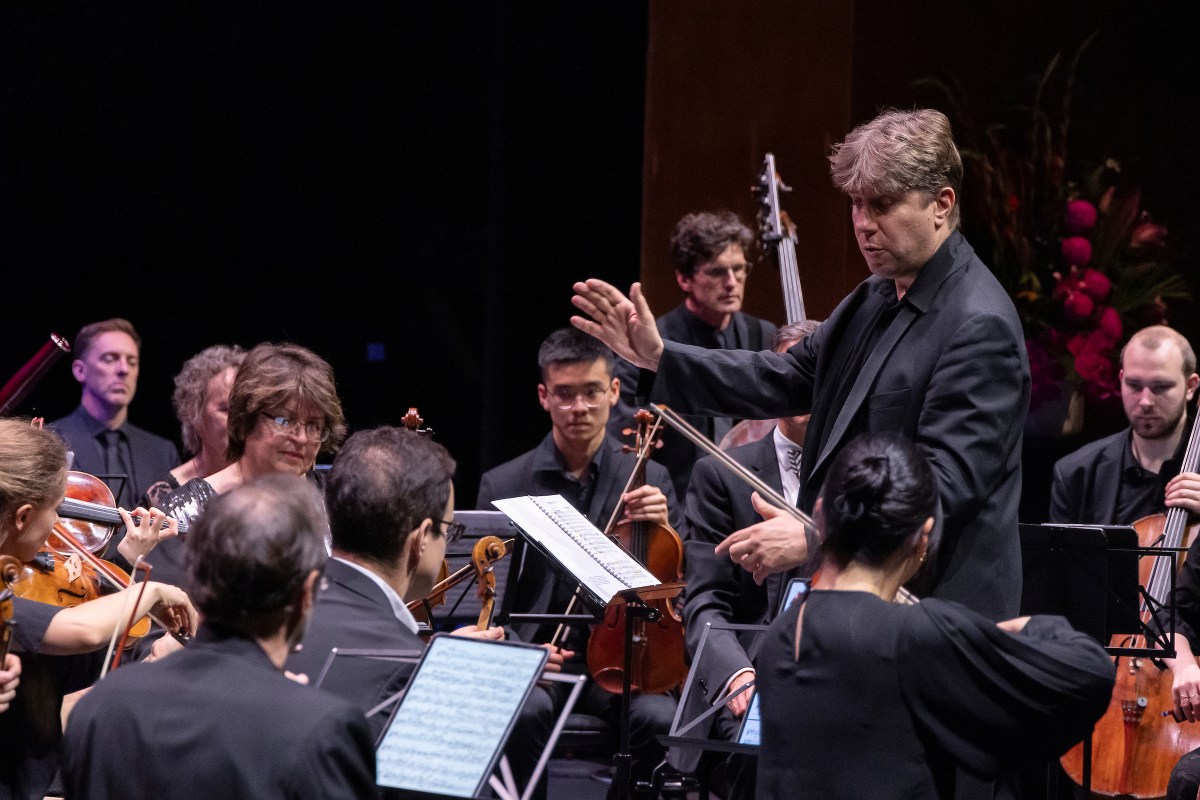The evening commenced with Richard Wagner’s marvellous Siegfried Idyll, written as a birthday present to his second wife, Cosima, and later included in part in his third opera of The Ring Cycle, Siegfried. It is a glorious piece of musical writing, with the powerful romance of Brünnhilde and Siegfried at its core, passionate and full of heightened emotion. There is all manner of reference to magic, dreams, lullabies and bird song, intertwined within Wagner’s leitmotivs and evocative and tender music.
It was realised by a large ensemble of string and woodwind players, with additional trumpet, under conductor Thomas Carroll, who managed his forces with great aplomb. The much-lauded violinist, Emily Sun, in her first appearance at the Australian Festival of Chamber Music (AFCM), led the ensemble as concertmaster with a decisive and firm hand, her solos fresh and poignant. The shimmering gentle strings of the opening led to Wagner’s distinctive leitmotivs of his main characters from the woodwind. Joshua Oates’ oboe was particularly impressive throughout the Idyll, alongside the darker, lush tones of Matthew Hunt’s clarinet. Katy Woolley’s evocative French horn and David Elton’s finely played trumpet gave a depth of sound to Wagner’s colourful musical pallet.
There was a real sense of longing and of deep emotion between the main protagonists in this work. A sweeping legato from the higher strings, underscored by the sweet, warm sonority of the celli, delivered a beautifully executed and emotional work.
Camille Saint-Saёns’ Romance for Horn and Orchestra in E major, Op.67 was written to laud a contemporary horn virtuoso and has remained a popular work for French horn ever since. Woolley grasped this opportunity firmly, giving the most impressive and strong rendition of the work, showing off the finer points of her instrument with beautiful phrasing and controlled top notes. A first-rate performance.
The next piece was to have been the famous ‘Baïlèro’ from Canteloube’s Songs of the Auvergne, but Rachelle Durkin, a last-minute replacement for Lorina Gore, sang a few songs by Gabriel Fauré instead, including his ‘Poème d’un jour’. Without the translation or any indication of what was being sung, these fell rather flat and left little impression. She was more successful in ‘Morgen!’ from Richard Strauss’ Four Songs – its steely core possibly a better match vocally for her soprano. Nevertheless, her vocal quality was underpowered and there was a sameness about the delivery, despite their different styles and languages. By contrast, Jack Liebeck delivered a heart-felt and whisper soft accompaniment to ‘Morgen!’ on the violin, which was mesmerising.
Dvořák’s Romance in F minor, B.39 Op.11 shows off to advantage the trademark romantic lyricism and sparkling colours of the composer’s soundscape. The piece starts gently with the woodwind passing the main theme from player to player before the violin enters with a completely different melody. From there the wind players and violin jostle for their respective space, but the violin breaks away, managing to soar ethereally above the quintet and piano.
All of the woodwind, accompanied by Joseph Havlat on piano, played this work with passion. French violinist Charlotte Saluste-Bridoux, making her debut with the AFCM, led the woodwind quintet and delivered an astonishingly virtuosic performance. Dvořák wrote extremely difficult music for the violin in this Romance, but Saluste-Bridoux rose to the challenge with ease, her technical prowess and acuity imbuing the work with emotional richness.
Read: Fine music ensembles are on the rise, but what is driving their success?
Fauré’s Piano Quartet No.1 in C minor, Op.15 is a glorious romantic work in four movements for virtuosic players. With Liebeck (violin), Timothy Ridout (viola), Thomas Carroll (cello) and Charles Owen (piano) we had a perfect combination of technical skills, power and risk-taking to make this work really sizzle and lift it off the page.
The Allegro molto moderato commenced with a strong and vibrant piano leading the theme, quickly taken up by the strings and passed back and forth with alacrity and ease. The melody then swells and subsides before the Scherzo: Allegro Viva offered a fast-running rhythm with pizzicato strings that was joyously played. The soft slow Adagio movement gave us perfect dynamics, the warmth of the cello highlighting the violin’s sweetness with an exceptionally melodic and vibrant viola. Meanwhile, the piano kept up a powerful running commentary before the Allegro molto gave each instrument the chance to shine. In a race to the end, pushed along by the piano’s lightning playing up and down the keyboard, the strings took on a brisk, galloping pace driving towards a frenzied and fierce ending.
Quite brilliantly played, this was a fitting conclusion to the concert and a whirlwind of a performance.
Governor’s Gala: Romance isn’t Dead, Yet…
Townsville Civic Theatre, 29 July 2023
The Australian Festival of Chamber Music continues until Sunday 6 August 2023
Artistic Director: Jack Liebeck
Artists: Goldner Quartet, Jack Liebeck, Emily Sun, Charlotte Saluste-Bridoux, Timothy Ridout, Sally Beamish, Thomas Carroll, Charlotte Miles, Kees Boersma, Prudence Davis, Joshua Oates, Matthew Hunt, Lloyd van’t Hoff, Nicole Tait, Katy Woolley, David Elton, Rachelle Durkin, Joseph Havlat, Charles Owen, Ting-Ru Lai, Andrew Wang, David Zheng, Benjamin Lam, Ariel Volovelsky, Bryn Arnold, Stephen Johnson.





